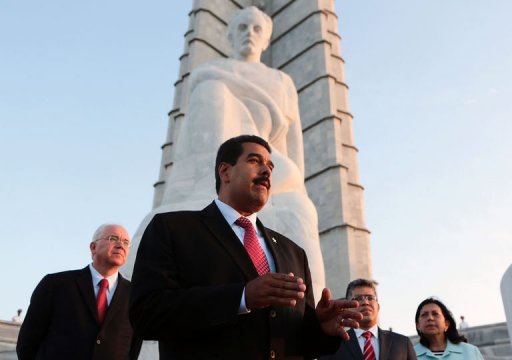Venezuelan President Nicolas Maduro wrapped up a two-day visit to Cuba late Sunday in which the two allies reaffirmed their strategic alliance, signing $1 billion in cooperation agreements.
The visit, which came just two weeks after Maduro's election to replace the late Hugo Chavez, was hailed as great success by state media, which said it will help Havana and Caracas "strengthen our union."
The two countries said they signed 51 agreements encompassing health, education, transportation, sports, energy and special "social missions."
Maduro, before he departed the island, hailed his nation's relationship with Cuba as "a strategic alliance that transcends the times; more than an alliance, it is a brotherhood."
Cuba is only the second country Maduro has visited since his slim, April 14 election victory -- the subject of a bitter, unresolved dispute with the opposition, which alleges that the vote was stolen.
Maduro held talks with President Raul Castro, who reaffirmed Cuba's "unyielding will to continue cooperation in solidarity with Venezuela, determined to share our fate with the heroic Venezuelan people."
He also held a separate, five-hour meeting with Fidel Castro, 86, the retired leader of the Cuban revolution, who paid homage to his dear friend Chavez and the alliance that the two nations forged in October 2002.
The relationship has been crucial to Cuba, shoring up a Soviet-style economy that has floundered since the collapse of the Soviet Union in 1989.
The deal is Cuba's biggest source of cash, well ahead of money sent home by expatriate Cubans, tourism or exports of nickel, tobacco and drugs.
The two allies also have engaged in a variety of joint projects, like a refinery in Cienfuegos, Cuba.
An estimated 40,000 Cuban doctors, technicians and advisers work in Venezuela, which supplies Cuba with 130,000 barrels of oil a day as part of a 12-year-old relationship that has closely bound together their leftist, anti-US governments.
But the Cuban connection also remains a point of heated contention in Venezuela, which split 50.8-49 in the elections to succeed Chavez and saw some 700,000 people switch to the opposition.
During the election campaign, opposition candidate Henrique Capriles repeatedly attacked the "gifts" sent from Venezuela to Cuba, calling Maduro "Cuba's candidate" and demanding that Caracas cut off oil supplies to Havana.
Venezuela's National Electoral Council plans to begin an expanded audit of the results on Monday, but cautioned the move cannot overturn Maduro's win.
The opposition has until the end of next week to file suit with the Supreme Court to contest the outcome.




















































